Let's be honest—managing HR with spreadsheets is a nightmare. You've got employee data scattered everywhere, performance reviews stuffed in folders.
The good news? There are HR platforms that can fix this mess. The tricky part? Picking the right one.
Here's what you need to know: Workday and HiBob are both great HR tools, but they're made for totally different companies.
Workday is the heavy-duty option. Think of it like a massive toolbox with everything you could ever need—perfect if you're running a big company with complex needs. Companies like Netflix use it because they've got thousands of employees and need serious power.
HiBob is different. It's built for growing teams who want something that actually feels modern and easy to use. Instead of overwhelming you with features, it focuses on keeping your team engaged and making HR less of a headache.
This comparison breaks down detailed features, pricing, and pros and cons of both platforms to help you make the right choice for your team.
Workday
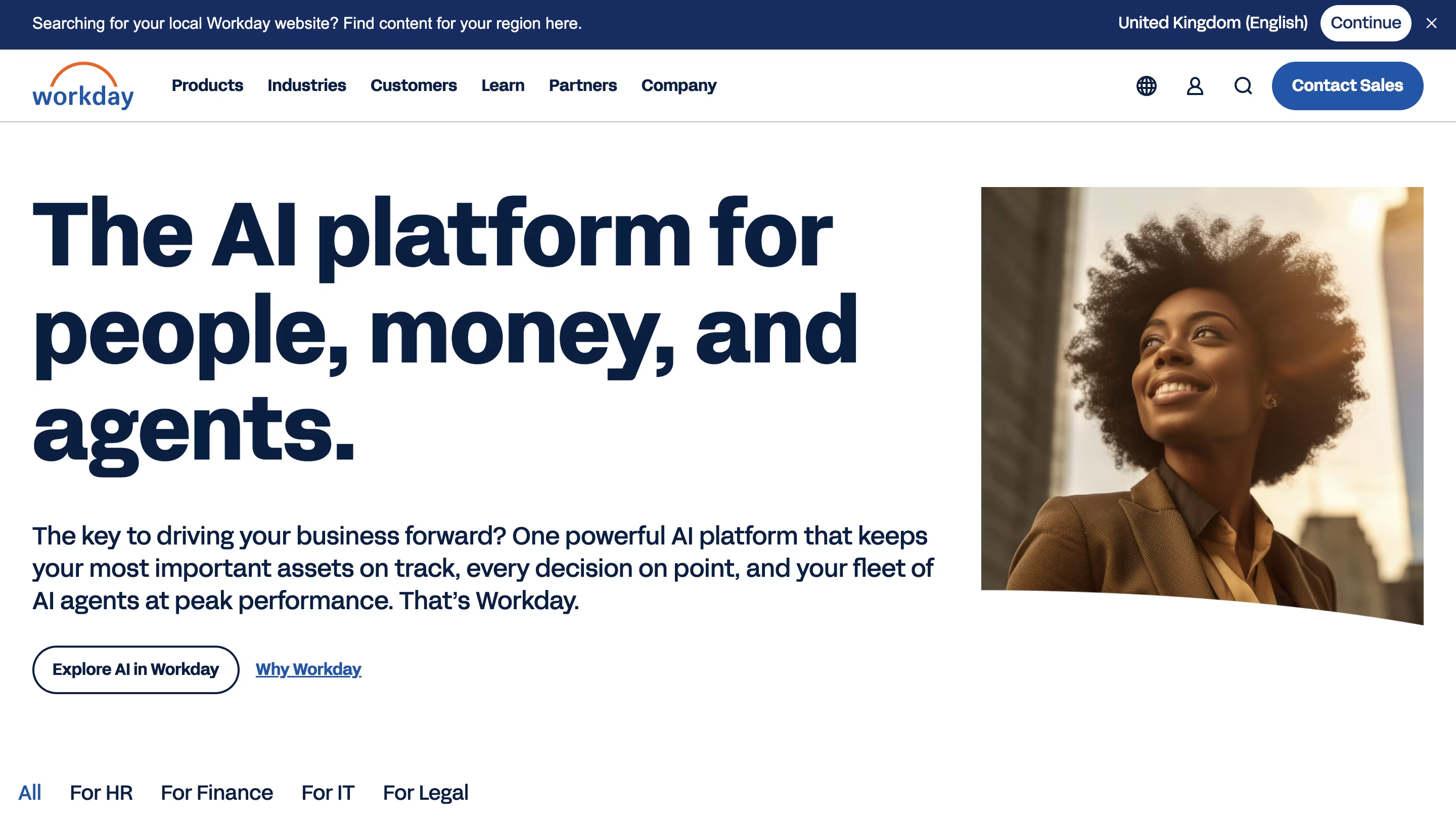
Workday is an enterprise-grade Human Capital Management (HCM) system that unifies HR, payroll, talent management, and finance into one comprehensive platform. It's designed for large organizations that need to manage complex, global operations with tight integration between people and financial data.
Since 2005, Workday has been the go-to choice for Fortune 500 companies that require serious analytical power, regulatory compliance, and the ability to handle multiple legal entities across different countries.
Core Features That Make Workday Powerful
1. Human Resources & Workforce Management
Workday handles global HR operations like a pro. We're talking employee lifecycle management, workforce planning, organizational charts, and absence tracking across multiple legal entities, currencies, and compliance frameworks. If your company operates in 15 countries with different labor laws, Workday can handle it all under one roof.
2. Talent, Performance & Development
This is where Workday really flexes its muscles. The platform integrates talent management with organizational performance using AI-driven insights. Its learning management system doesn't just track training—it uses machine learning to recommend personalized development paths and maps future career trajectories based on skills and performance data.
3. Payroll, Compensation & Benefits
Workday offers native payroll processing in multiple regions and integrates seamlessly with external payroll engines where needed. The compensation modeling tools help with total rewards management, equity planning, and benefits administration across global teams.
4. Analytics & Insights That Actually Matter
Here's where Workday separates itself from simpler HR tools. The analytics stack, powered by Workday Prism, delivers predictive modeling and real-time insights that connect workforce data with financial results. HR teams can identify skill gaps, analyze turnover risks, and make data-backed decisions about hiring and development.
5. Integrations & Extensibility
Workday's open API ecosystem connects with ERP systems, recruiting software, and finance tools. However, these integrations often require implementation partners and extended setup timelines—something to factor into your decision.
6. Security & Compliance
With enterprise-level security, SOC certifications, and GDPR compliance, Workday is built for organizations that can't afford security breaches or compliance failures.
Workday Pricing
Here's where things get expensive—and I mean really expensive. Workday doesn't publish pricing publicly, which should tell you something about their target market. But here's what industry sources and actual customers reveal about the real costs:
The Numbers That Matter:
- Average cost: $100-$200 per employee per year for basic HCM modules (that's $8-17 monthly per employee)
- But here's the catch: Most organizations need multiple modules, pushing costs to $200-$400+ per employee annually
- Implementation costs: $500,000-$2M+ depending on your organization's complexity
- Annual organizational spend: $30,000-$350,000+ just for software licensing
The Hidden Costs Nobody Talks About:
Beyond the base licensing fees, you'll need specialized Workday consultants (often $200-$400 per hour), ongoing system administration by certified professionals, and annual maintenance fees that can add 30-50% to your total cost.
Reality Check: Workday typically requires 3-5 year commitments with limited flexibility to reduce modules or users mid-contract. Early termination fees can be substantial, and you're basically locked into their ecosystem once you're in. [Source: OutSail]
What Works About Workday
Enterprise-grade everything: When you need to unify HR, finance, and planning across multiple countries with different legal requirements, Workday delivers like nothing else can. [Source: Slit]
Serious analytics power: We're talking AI-powered predictive insights that help large organizations make strategic workforce decisions based on real data, not gut feelings. [Source: Slit]
Built for complexity: If you're managing thousands of employees across different legal entities, currencies, and compliance frameworks, Workday handles it all under one roof. [Source: People Managing People]
What Drives People Crazy About Workday
Sticker shock: The total cost of ownership often surprises companies. You're looking at $1M+ for implementation alone for most mid-to-large enterprises, plus ongoing costs that never seem to stop growing. [Source: People Managing People]
Implementation nightmare: Most deployments take 6-18 months and require dedicated Workday specialists. You can't just "figure it out" as you go—this needs serious planning and resources. [Source: Siit]
Minimum viable size: Workday doesn't make financial sense for organizations under 1,000-2,000 employees. For companies with 500-1,000 employees, you're looking at $400,000-$600,000 annually in total costs, which is often cost-prohibitive. [Source: People Managing People]
The bottom line? Workday is incredibly powerful, but it's really built for large enterprises that can absorb the costs and complexity. For most growing organizations, the investment just doesn't make sense when there are more affordable, easier-to-implement alternatives that deliver similar features.
Workday Review:
Workday G2 review: 4.1/5
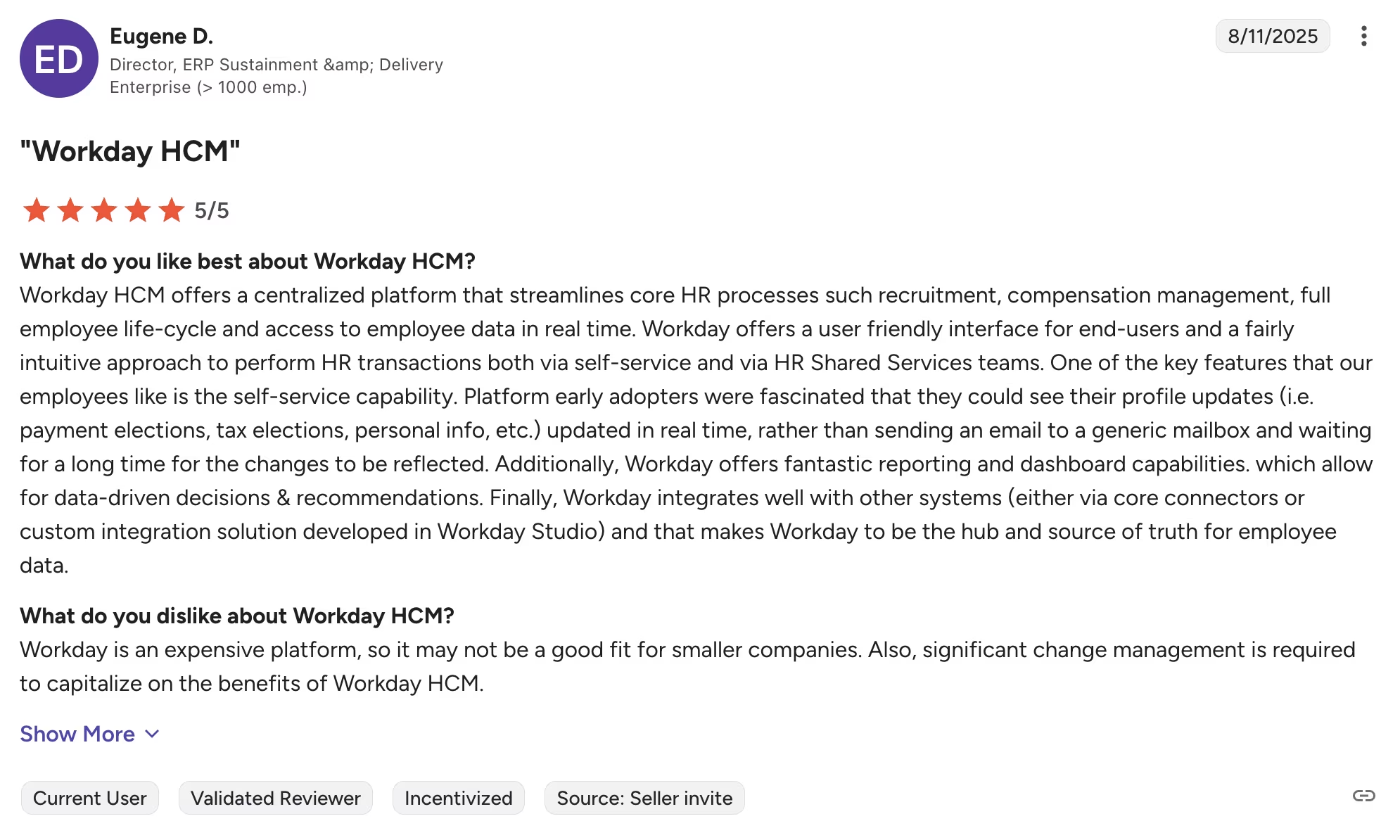
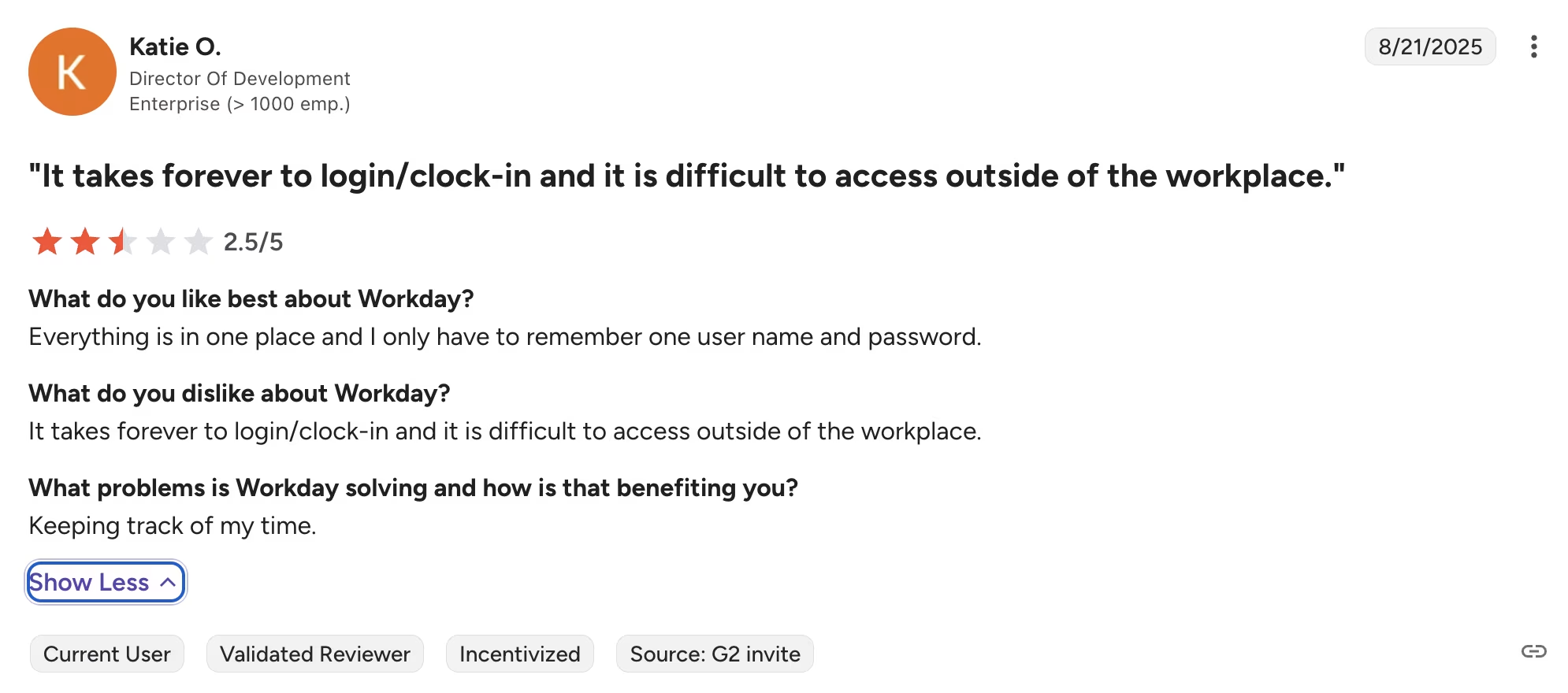
Now will look into what HiBob offers:
HiBob
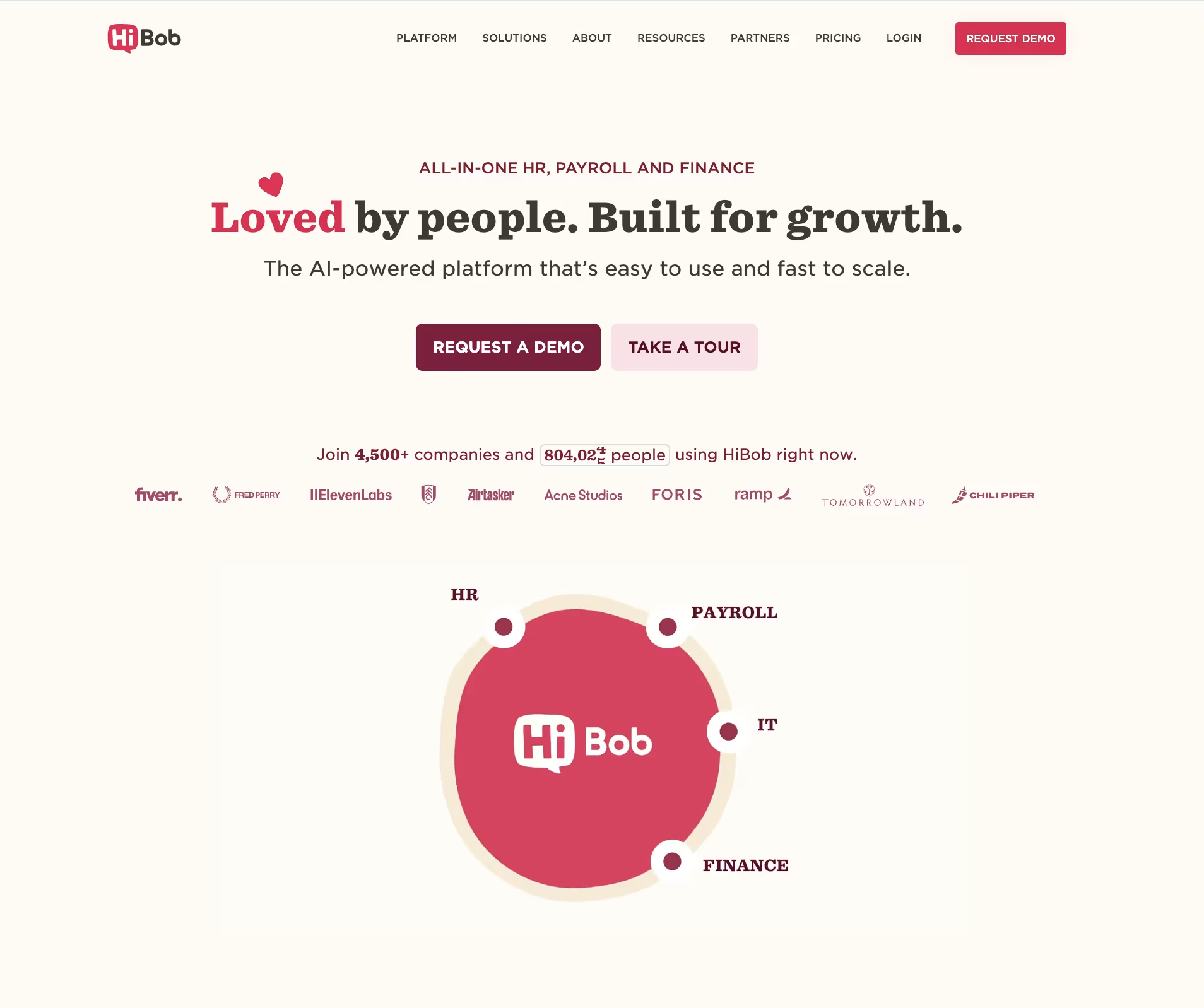
HiBob (Bob) is a modern HRIS platform built specifically for growing, people-centric companies. Instead of trying to be everything to everyone, it focuses on user experience, employee engagement, and streamlined workflows that make HR feel less like bureaucracy and more like community building.
HiBob powers HR teams in over 100 countries, helping mid-sized companies foster culture, manage people data, and automate everyday HR processes without the enterprise-scale complexity.
Core Features That Make HiBob Special
1. Core HR & Employee Management
HiBob centralizes employee data, onboarding workflows, time-off management, and HR documents in one accessible dashboard. It supports global teams with localized time-off policies, region-specific holidays, and custom workflows that adapt to different countries' requirements.
2. Performance & Development That People Actually Use
HiBob supports continuous performance management through 360° feedback, goal alignment (including OKRs), and regular check-ins. The platform makes performance conversations feel natural rather than formal, which increases participation and meaningful feedback.
3. Engagement & Culture Tools
This is where HiBob really shines. The platform includes pulse surveys, eNPS tracking, and social-style recognition feeds that help organizations understand and improve morale in real time. The Culture Hub enables teams to share updates, celebrate wins, and stay connected—especially important for remote and hybrid teams.
4. Compensation & Payroll Integration
The Payroll Hub connects to major payroll providers like Gusto, ADP, and PayFit, automatically syncing employee data. HiBob's compensation planning tools simplify pay reviews, equity grants, and budgeting without requiring deep financial expertise.
5. Analytics & Reporting That Make Sense
While HiBob may not match Workday's analytical depth, it provides intuitive dashboards for tracking attrition, diversity, headcount trends, and engagement metrics. The insights are designed for HR teams who need actionable data, not data scientists.
6. Security & Compliance
HiBob complies with GDPR and SOC 2 Type II standards and provides robust access controls and data encryption. While not as comprehensive as Workday's enterprise security, it covers what most mid-sized organizations need.
HiBob Pricing:
Here's the challenge with HiBob—they don't publish detailed pricing publicly, which makes budgeting difficult upfront. Here's what verified sources confirm:
What We Actually Know:
- "Pricing not publicly available, requiring sales consultation"
- Basic range: $5-$10 per employee per month according to Software Finder analysis [Source: Software Finder]
- Custom quote system tailored to organization size and module needs
- Modular pricing structure - you pay for Core HR plus additional modules as needed
Reality Check: As one reviewer noted: "There's no public pricing information on the website, so you have to talk to sales for a custom quote". This means you'll need to go through their sales process before knowing if it fits your budget.
Implementation: No specific verified timeline data available - requires consultation for accurate estimates.
What People Love About HiBob
Modern interface that works: Multiple sources confirm the platform has an intuitive, user-friendly design that doesn't require extensive training.
Culture-focused features: Built-in engagement tools, social feeds, and pulse surveys that actually drive employee participation.
Flexible module approach: "All Bob pricing plans include Core HR and Digital Admin. Customers can then add different modules on top" - you only pay for what you need.
What Frustrates HiBob Users
Pricing opacity: "Pricing isn't transparent... you have to talk to sales for a custom quote" which makes upfront budgeting impossible.
Support inconsistencies: "Customer support response times can be slower than desired" according to verified user reviews.
Limited enterprise reporting: "Reporting module less comprehensive than some enterprise alternatives".
Regional limitations: "Native payroll is only available in the UK. Everyone else has to use the Payroll Hub, which adds an extra integration step".
HiBob Review:
HiBob G2 review: 4.5/5
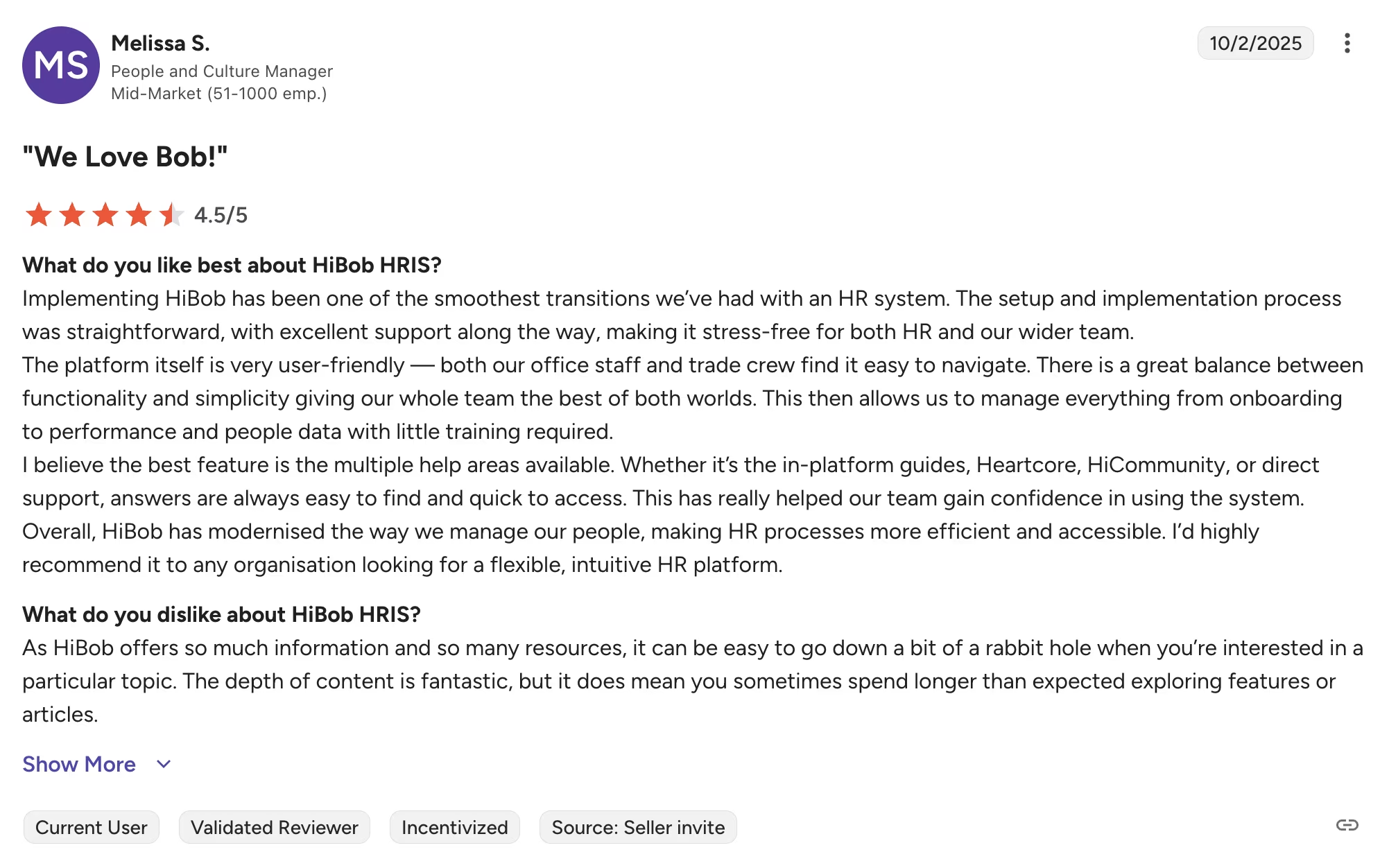

ThriveSparrow: The Balanced Alternative for Growing Teams
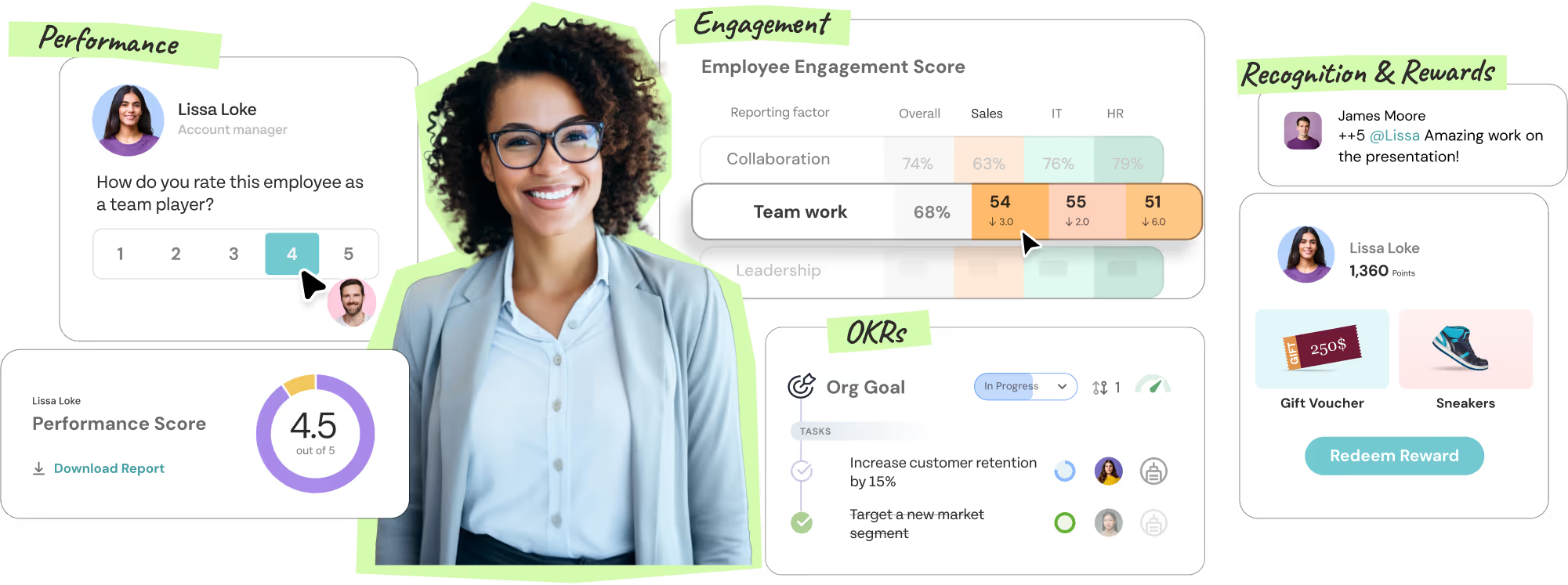
Let’s be real — most growing companies don’t need the weight of an enterprise system or the limits of a lightweight HR tool. What they need is a platform that actually helps people do better work, feel connected, and grow — without a six-month setup or a consultant on speed dial.
That’s where ThriveSparrow comes in.
Why ThriveSparrow Makes Sense
1. Engagement that actually leads to action
Look, plenty of platforms collect feedback. Workday gives you complex analytics, HiBob captures how people feel. ThriveSparrow connects the dots by turning all that feedback into insights you can actually use to improve your team's experience in real time, not six months later.
2. Performance management that doesn't feel like a chore
Forget annual review cycles that everyone dreads. ThriveSparrow makes performance conversations ongoing and natural with 360° feedback, goal alignment, and continuous check-ins that actually help people grow instead of just checking boxes.
3. Recognition that builds real culture
ThriveSparrow's recognition (via Kudos) is integrated with engagement and performance analytics — allowing recognition data to feed into overall sentiment and culture scores.
4. Scales with you, not against you
While Workday demands months of implementation and HiBob might leave you wanting more as you grow, ThriveSparrow grows seamlessly with your organization. You get the depth and clarity you need without the enterprise headaches or surprise costs.
The bottom line? If you're looking for something more powerful than basic HR tools but don't need full enterprise complexity, ThriveSparrow delivers exactly what growing organizations actually need—without the hassle.
ThriveSparrow Pricing:

Making the Right Choice: What Actually Matters for Your Organization
After looking at features, pricing, and real-world implementation experiences, the choice comes down to being honest about where your organization is right now and where it's realistically headed.
Choose Workday if:
- You're managing 2,000+ employees across multiple countries (not the 1,000+ mentioned earlier)
- Your annual HR technology budget exceeds $500,000
- You have dedicated Workday-certified staff or budget for ongoing consultants
- Complex global operations require enterprise-grade financial and HR integration
- You can commit to 3-5 year contracts without needing flexibility
Choose HiBob if:
- You value modern, intuitive interface design that doesn't require extensive training
- Culture and engagement tools are priorities for your organization
- You're comfortable with sales consultation pricing - no public pricing available
- Modular pricing approach appeals to you - pay for Core HR and add modules as needed
- You can work with potentially inconsistent support response times
Choose ThriveSparrow if:
- Performance management and employee engagement are combined priorities
- You need a balanced solution between basic HR tools and enterprise complexity
- Budget predictability is important for your planning process
- You prefer faster implementation without specialized consultants
Final Thoughts
Your HR platform choice directly impacts how employees experience work daily and how efficiently your organization operates. Workday delivers unmatched power for complex global operations requiring deep financial system integration. HiBob creates engaging experiences through intuitive design and cultural tools for growing teams.
Most mid-market companies need something different—ThriveSparrow offers that sweet spot. It combines robust performance management with engagement insights, giving you enterprise capabilities at a reasonable scale and cost.
The winning platform isn't about features—it's about consistent usage that builds better workplace culture and drives measurable results. Make your choice based on today's reality and budget, not future aspirations.
Ready to transform your HR operations? Experience ThriveSparrow's balanced approach to performance and engagement management with a free trial today.
Frequently Asked Questions
1. How much does Workday cost compared to HiBob?
Workday typically costs $100-$200+ per employee annually with implementation starting at $500K-$2M+. HiBob ranges from $16-$25 per employee monthly with much lower implementation costs of $5,000-$15,000.
2. Which platform is easier to implement: Workday or HiBob?
HiBob implementation typically takes 2-6 months with minimal training required. Workday implementation usually takes 6-18 months and requires dedicated specialists and extensive employee training.
3. Can HiBob handle global operations like Workday?
HiBob supports global teams across 100+ countries with localized compliance and multi-currency support. However, Workday offers more comprehensive global compliance and financial integration for complex multinational operations.
4. What's the main difference between Workday and HiBob's analytics?
Workday provides enterprise-grade predictive analytics and AI-powered insights across HR and finance. HiBob offers intuitive people analytics focused on engagement, retention, and workforce trends suitable for mid-market needs.
5. Which platform is better for employee engagement and culture?
HiBob excels at employee engagement with social features, pulse surveys, recognition feeds, and culture-building tools. Workday focuses more on operational efficiency and compliance rather than engagement-specific features
The bottom line? If you're looking for something more powerful than basic HR tools but don't need full enterprise complexity, ThriveSparrow delivers exactly what growing organizations actually need—without the hassle.
ThriveSparrow Pricing:

Making the Right Choice: What Actually Matters for Your Organization
After looking at features, pricing, and real-world implementation experiences, the choice comes down to being honest about where your organization is right now and where it's realistically headed.
Choose Workday if:
- You're managing 2,000+ employees across multiple countries (not the 1,000+ mentioned earlier)
- Your annual HR technology budget exceeds $500,000
- You have dedicated Workday-certified staff or budget for ongoing consultants
- Complex global operations require enterprise-grade financial and HR integration
- You can commit to 3-5 year contracts without needing flexibility
Choose HiBob if:
- You value modern, intuitive interface design that doesn't require extensive training
- Culture and engagement tools are priorities for your organization
- You're comfortable with sales consultation pricing - no public pricing available
- Modular pricing approach appeals to you - pay for Core HR and add modules as needed
- You can work with potentially inconsistent support response times
Choose ThriveSparrow if:
- Performance management and employee engagement are combined priorities
- You need a balanced solution between basic HR tools and enterprise complexity
- Budget predictability is important for your planning process
- You prefer faster implementation without specialized consultants
Final Thoughts
Your HR platform choice shapes how your employees experience work every day and how efficiently your organization operates. Workday delivers enterprise-grade power when you're managing complex global operations with thousands of employees and need deep integration between HR and financial systems. HiBob excels at creating engaging, culture-focused HR experiences for growing organizations that value intuitive design and employee participation.
But here's what many mid-market companies discover: they need something that bridges the gap between basic HR tools and enterprise complexity. That's exactly where ThriveSparrow makes the difference.
ThriveSparrow combines the best of both platforms—offering comprehensive performance management, AI-powered engagement insights, and 360-degree feedback tools without the enterprise price tag or lengthy implementation process. You get the analytical depth to make smart people decisions, plus the culture-building features that actually drive engagement, all in a platform that grows with your organization.
The best HR platform isn't the one with the most features—it's the one your team will consistently use to build better workplace culture and drive real business results. Choose based on your current reality and budget, not aspirational complexity.
Ready to transform your HR operations? Experience ThriveSparrow's balanced approach to performance and engagement management with a free trial today.
Frequently Asked Questions
1. How much does Workday cost compared to HiBob?
Workday typically costs $100-$200+ per employee annually with implementation starting at $500K-$2M+. HiBob ranges from $16-$25 per employee monthly with much lower implementation costs of $5,000-$15,000.
2. Which platform is easier to implement: Workday or HiBob?
HiBob implementation typically takes 2-6 months with minimal training required. Workday implementation usually takes 6-18 months and requires dedicated specialists and extensive employee training.
3. Can HiBob handle global operations like Workday?
HiBob supports global teams across 100+ countries with localized compliance and multi-currency support. However, Workday offers more comprehensive global compliance and financial integration for complex multinational operations.
4. What's the main difference between Workday and HiBob's analytics?
Workday provides enterprise-grade predictive analytics and AI-powered insights across HR and finance. HiBob offers intuitive people analytics focused on engagement, retention, and workforce trends suitable for mid-market needs.
5. Which platform is better for employee engagement and culture?
HiBob excels at employee engagement with social features, pulse surveys, recognition feeds, and culture-building tools. Workday focuses more on operational efficiency and compliance rather than engagement-specific features
The bottom line? If you're looking for something more powerful than basic HR tools but don't need full enterprise complexity, ThriveSparrow delivers exactly what growing organizations actually need—without the hassle.
ThriveSparrow Pricing:

Making the Right Choice: What Actually Matters for Your Organization
After looking at features, pricing, and real-world implementation experiences, the choice comes down to being honest about where your organization is right now and where it's realistically headed.
Choose Workday if:
- You're managing 2,000+ employees across multiple countries (not the 1,000+ mentioned earlier)
- Your annual HR technology budget exceeds $500,000
- You have dedicated Workday-certified staff or budget for ongoing consultants
- Complex global operations require enterprise-grade financial and HR integration
- You can commit to 3-5 year contracts without needing flexibility
Choose HiBob if:
- You value modern, intuitive interface design that doesn't require extensive training
- Culture and engagement tools are priorities for your organization
- You're comfortable with sales consultation pricing - no public pricing available
- Modular pricing approach appeals to you - pay for Core HR and add modules as needed
- You can work with potentially inconsistent support response times
Choose ThriveSparrow if:
- Performance management and employee engagement are combined priorities
- You need a balanced solution between basic HR tools and enterprise complexity
- Budget predictability is important for your planning process
- You prefer faster implementation without specialized consultants
Final Thoughts
Your HR platform choice shapes how your employees experience work every day and how efficiently your organization operates. Workday delivers enterprise-grade power when you're managing complex global operations with thousands of employees and need deep integration between HR and financial systems. HiBob excels at creating engaging, culture-focused HR experiences for growing organizations that value intuitive design and employee participation.
But here's what many mid-market companies discover: they need something that bridges the gap between basic HR tools and enterprise complexity. That's exactly where ThriveSparrow makes the difference.
ThriveSparrow combines the best of both platforms—offering comprehensive performance management, AI-powered engagement insights, and 360-degree feedback tools without the enterprise price tag or lengthy implementation process. You get the analytical depth to make smart people decisions, plus the culture-building features that actually drive engagement, all in a platform that grows with your organization.
The best HR platform isn't the one with the most features—it's the one your team will consistently use to build better workplace culture and drive real business results. Choose based on your current reality and budget, not aspirational complexity.
Ready to transform your HR operations? Experience ThriveSparrow's balanced approach to performance and engagement management with a free trial today.
Frequently Asked Questions
1. How much does Workday cost compared to HiBob?
Workday typically costs $100-$200+ per employee annually with implementation starting at $500K-$2M+. HiBob ranges from $16-$25 per employee monthly with much lower implementation costs of $5,000-$15,000.
2. Which platform is easier to implement: Workday or HiBob?
HiBob implementation typically takes 2-6 months with minimal training required. Workday implementation usually takes 6-18 months and requires dedicated specialists and extensive employee training.
3. Can HiBob handle global operations like Workday?
HiBob supports global teams across 100+ countries with localized compliance and multi-currency support. However, Workday offers more comprehensive global compliance and financial integration for complex multinational operations.
4. What's the main difference between Workday and HiBob's analytics?
Workday provides enterprise-grade predictive analytics and AI-powered insights across HR and finance. HiBob offers intuitive people analytics focused on engagement, retention, and workforce trends suitable for mid-market needs.
5. Which platform is better for employee engagement and culture?
HiBob excels at employee engagement with social features, pulse surveys, recognition feeds, and culture-building tools. Workday focuses more on operational efficiency and compliance rather than engagement-specific features
The bottom line? If you're looking for something more powerful than basic HR tools but don't need full enterprise complexity, ThriveSparrow delivers exactly what growing organizations actually need—without the hassle.
ThriveSparrow Pricing:

Making the Right Choice: What Actually Matters for Your Organization
After looking at features, pricing, and real-world implementation experiences, the choice comes down to being honest about where your organization is right now and where it's realistically headed.
Choose Workday if:
- You're managing 2,000+ employees across multiple countries (not the 1,000+ mentioned earlier)
- Your annual HR technology budget exceeds $500,000
- You have dedicated Workday-certified staff or budget for ongoing consultants
- Complex global operations require enterprise-grade financial and HR integration
- You can commit to 3-5 year contracts without needing flexibility
Choose HiBob if:
- You value modern, intuitive interface design that doesn't require extensive training
- Culture and engagement tools are priorities for your organization
- You're comfortable with sales consultation pricing - no public pricing available
- Modular pricing approach appeals to you - pay for Core HR and add modules as needed
- You can work with potentially inconsistent support response times
Choose ThriveSparrow if:
- Performance management and employee engagement are combined priorities
- You need a balanced solution between basic HR tools and enterprise complexity
- Budget predictability is important for your planning process
- You prefer faster implementation without specialized consultants
Final Thoughts
Your HR platform choice shapes how your employees experience work every day and how efficiently your organization operates. Workday delivers enterprise-grade power when you're managing complex global operations with thousands of employees and need deep integration between HR and financial systems. HiBob excels at creating engaging, culture-focused HR experiences for growing organizations that value intuitive design and employee participation.
But here's what many mid-market companies discover: they need something that bridges the gap between basic HR tools and enterprise complexity. That's exactly where ThriveSparrow makes the difference.
ThriveSparrow combines the best of both platforms—offering comprehensive performance management, AI-powered engagement insights, and 360-degree feedback tools without the enterprise price tag or lengthy implementation process. You get the analytical depth to make smart people decisions, plus the culture-building features that actually drive engagement, all in a platform that grows with your organization.
The best HR platform isn't the one with the most features—it's the one your team will consistently use to build better workplace culture and drive real business results. Choose based on your current reality and budget, not aspirational complexity.
Ready to transform your HR operations? Experience ThriveSparrow's balanced approach to performance and engagement management with a free trial today.
Frequently Asked Questions
1. How much does Workday cost compared to HiBob?
Workday typically costs $100-$200+ per employee annually with implementation starting at $500K-$2M+. HiBob ranges from $16-$25 per employee monthly with much lower implementation costs of $5,000-$15,000.
2. Which platform is easier to implement: Workday or HiBob?
HiBob implementation typically takes 2-6 months with minimal training required. Workday implementation usually takes 6-18 months and requires dedicated specialists and extensive employee training.
3. Can HiBob handle global operations like Workday?
HiBob supports global teams across 100+ countries with localized compliance and multi-currency support. However, Workday offers more comprehensive global compliance and financial integration for complex multinational operations.
4. What's the main difference between Workday and HiBob's analytics?
Workday provides enterprise-grade predictive analytics and AI-powered insights across HR and finance. HiBob offers intuitive people analytics focused on engagement, retention, and workforce trends suitable for mid-market needs.
5. Which platform is better for employee engagement and culture?
HiBob excels at employee engagement with social features, pulse surveys, recognition feeds, and culture-building tools. Workday focuses more on operational efficiency and compliance rather than engagement-specific features
















